
4 minute read
Ideas in Store
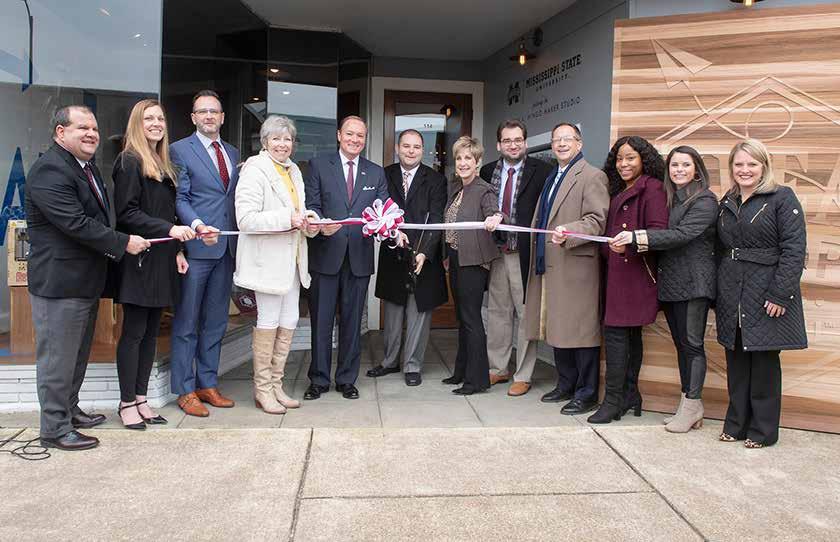
Photo by Beth Wynn

Photo by Megan Bean
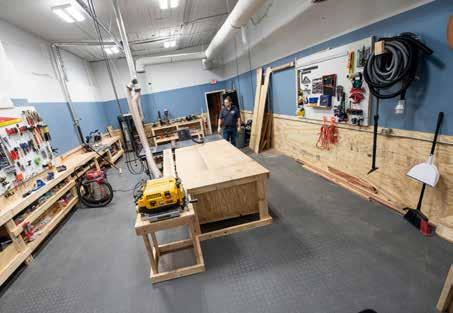
Photo by Megan Bean
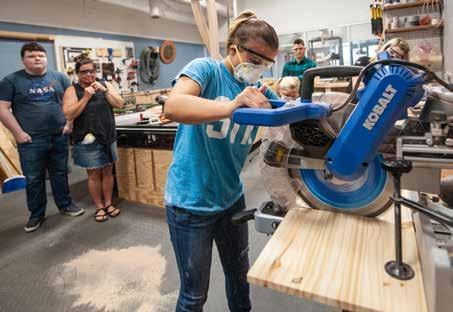
Photo by Logan Kirkland
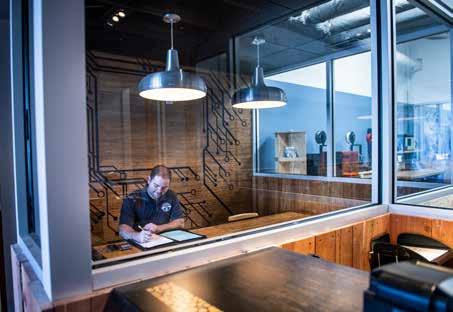
Photo by Megan Bean
Ideas in Store
By Emily Daniels
Now, more than ever, entrepreneurship seems to be the occupation of the future. In the past, entrepreneurship was mainly perceived as a career path only for students and young professionals – think Bill Gates, Steve Jobs and Mark Zuckerberg, all in their 20s when they launched their worldchanging companies. But in today’s business world you will find that people of all ages are taking a chance at becoming their own boss. According to studies out of Duke University, the Ewing Marion Kauffman Foundation and the Founder Institute and Northwestern University, the average entrepreneur is 40 years old when launching his or her first startup, and the average age of leaders of high-growth startups is 45 years old. Even the 55- to 64-year-old age group accounted for 26 percent of new entrepreneurs in 2017, according to the Kauffman Foundation. Cities and towns are encouraging the spread of entrepreneurship by supporting incubators, accelerators and new business competitions in their communities. And Starkville, MS, is no exception.
This past spring, MSU’s Center for Entrepreneurship and Outreach teamed up with the School of Human Sciences and the Greater Starkville Development Partnership to create a much-needed workshop and retail space for budding local entrepreneurs. The project was made possible by numerous private contributions – including a major one from 1967 College of Business graduate Turner Wingo – and support by the USDA Rural Business Development program.
Mississippi State University and Starkville city officials held a ribbon cutting ceremony on March 7, 2019, to formally open the Idea Shop – a 2,000-square-foot Main Street facility that includes the Turner A. Wingo Maker Studio – and the MSU Retail Product Accelerator.
Michael Lane, who graduated from MSU in December 2018 with a bachelor’s degree in mechanical engineering, was named Program Coordinator for this new downtown makerspace and retail storefront, which are operated by the College of Business and the School of Human Sciences.
“I grew up around tools and spent time working on construction sites with my dad,” says Lane. “I realized how important it is for people who design to actually know how to build what they are designing. That’s why I decided to get involved in the makerspace and give people the opportunities that I had growing up: to use tools, build what they want and be a part of projects.”
During his undergraduate career, Lane became a champion of the maker movement at MSU. The Amory native was a founding member of The Factory, an organization on campus launched in 2014, and he helped grow the organization to more than 200 active members. Lane traveled to more than 10 universities and conferences around the country to benchmark MSU against other institutions and help inform the University’s strategy to grow the maker movement.
“The Factory was housed in Patterson Hall on campus, and while it was a convenient location for students and faculty, it wasn’t easily accessible for others,” says Lane. “I always wanted [the makerspace] to be located where the whole community could be involved, and The Idea Shop is perfect for that.”
The shop features two spaces: The front serves as the retail section of the store, while the back houses the physical workshop for product creation.
The Maker Studio provides a comprehensive array of design workstations with advanced fabrication tooling not commonly available, such as CNC routers, 3D printers, laser cutters and advanced woodworking and metalworking tools. The Studio always has skilled staff members on hand who can help customers use the tools. Lane says that it costs $10 to use the equipment for one day; however, customers can also purchase a membership to gain unlimited access to all the equipment during open hours.
Various workshops are regularly hosted for newcomers to the maker movement. “The goal is for us to offer workshops and things for the community to participate in at least once a month,” says Lane. “Many of the workshops are free, but some charge a small fee. For example, in June, we hosted a Father’s Day gift-making workshop. For $15, participants could build and customize a charging dock or coaster set.”
The front of the Idea Shop is a fully operational retail store, featuring products sourced from student and faculty entrepreneurs, in addition to other local community startups. The Shop provides an outlet for very early stage entrepreneurs and makers to gain direct experience in commerce and all associated functions of retailing a product, as well as a channel to test new ideas with real, paying customers.
“The retail area is great for our student start-ups to test out how receptive the public is to the products they are selling,” says Lane. “We also offer product space for local vendors as well, regardless of membership. There is a vendor application and rules and regulations on what can be sold. All of the products sold in the Idea Shop are handmade. From coffee and juice to jewelry and pottery, there’s something for everyone!”
The Idea Shop is open from 1 pm to 9 pm Wednesdays through Fridays, and 11 am to 7 pm on Saturdays and Sundays. For more information about the Idea Shop, visit www.ecenter.msstate.edu.
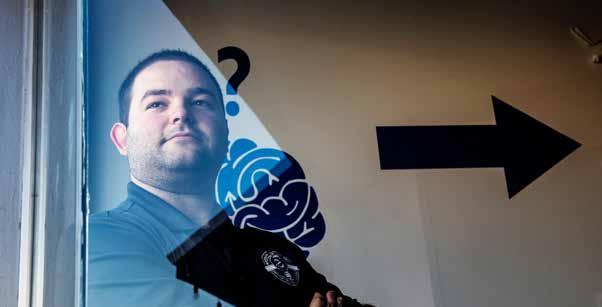
Program Coordinator Michael Lane looks out from the Idea Shop storefront into Main Street Starkville.
Photo by Megan Bean










